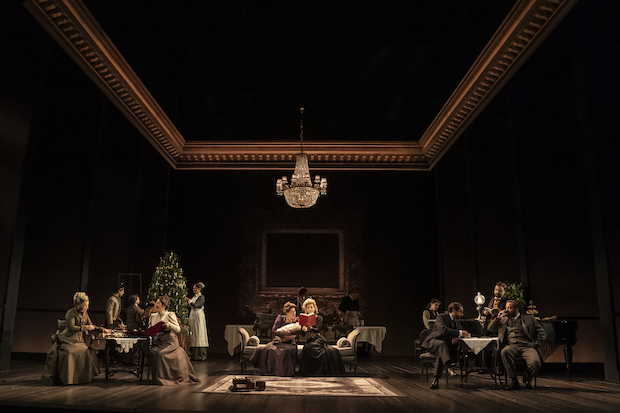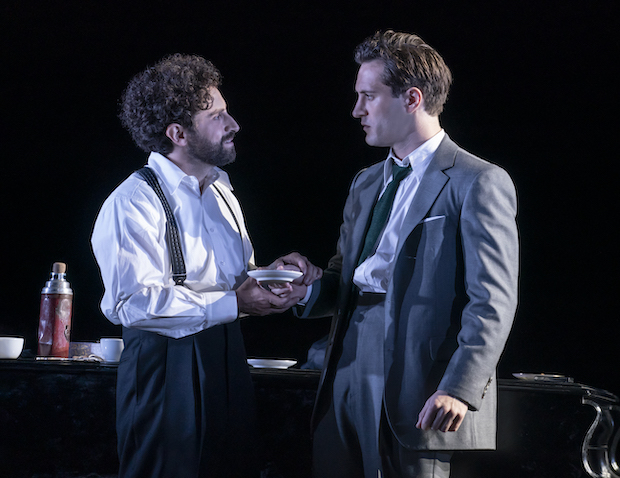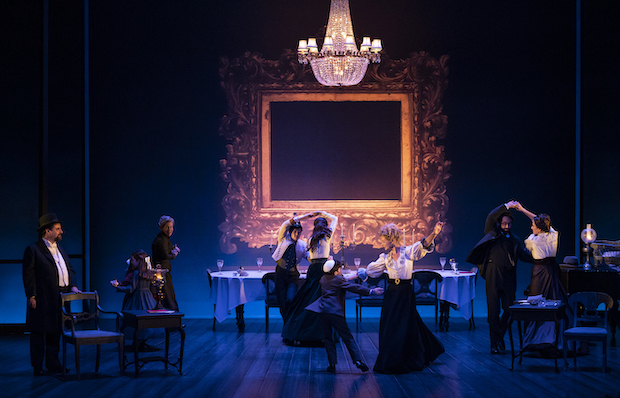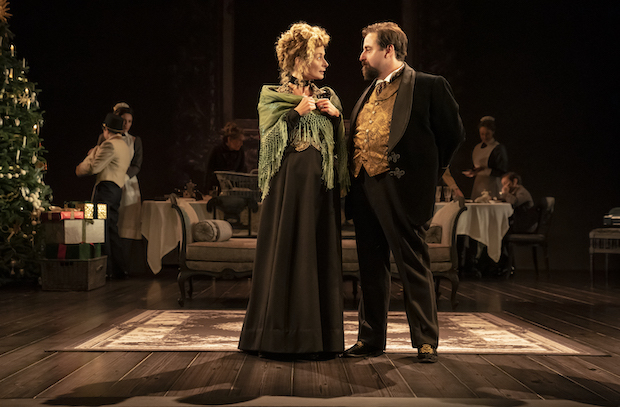Review: Leopoldstadt Considers the Price of Assimilation for One Jewish Family
Tom Stoppard’s latest play makes landfall on Broadway.

(© Joan Marcus)
If they’re going to live here, they need to assimilate to our culture. This is a common sentiment in Europe, especially since 2015, when German Chancellor Angela Merkel threw open the doors of her country (and by extension the rest of the continent) to refugees in what seemed to be an act of national atonement. Recently, voters in Sweden and Italy have registered their discontent by electing far-right politicians. Even in countries that maintain essentially liberal governments, the grumbling about “assimilation” only grows louder.
But is assimilation really what Europeans want from newcomers? What does one give up in the effort to fit in? And can one assimilate too well, so that disdain for outsiders curdles into resentment of elites? These questions swirl around Tom Stoppard’s Leopoldstadt, now making its U.S. debut at Broadway’s Longacre Theatre. It gives us a harrowing sense of where we may be heading by reminding us of the not-too-distant past through the tragic story of one family — who are not actually foreigners in their land, despite what so many of their countrymen say.
That’s the Merz-Jakobovicz clan, an extended family of Viennese Jews prospering under the enlightened rule of Emperor Franz Joseph. The scene opens on their flat just off the Ringstrasse (Vienna’s answer to Fifth Avenue) where they have gathered to celebrate Christmas 1899. Grandma Emilia (a delightfully sassy Betsy Aidem) cheerfully refers to her converted progeny as “papists” as little Jacob (Joshua Satine) innocently places a Star of David atop the Tannenbaum. Everyone has a good laugh.

(© Joan Marcus)
Downstage, Catholic convert Hermann (David Krumholtz) and brother-in-law Ludwig (Brandon Uranowitz) debate about Theodore Herzl and his vision of a Jewish homeland. Hermann doesn’t see any point in uprooting his family to Palestine when they’ve done so well in Austria: “My grandfather wore a caftan, my father went to the opera in a top hat, and I have the singers to dinner…This is the promised land.” But Ludwig is not so sure, and we with the benefit of hindsight know that his anxiety is warranted. As the years march on — 1900, 1924, 1938 — the rest of the family comes to know it too.
Stoppard’s story of a family that ascends from the periphery to the center of Habsburg society just in time for the empire to spectacularly collapse is reminiscent of Joseph Roth’s Radetzky March, and the sprawling cast of characters (requiring 38 actors, including children) would seem more appropriate to a novel than a modern drama that runs two hours, 10 minutes. The fact that we’re able to quickly grasp so many names and relationships so quickly is a testament to both the economy of Stoppard’s writing and the deep impression left by the performances.
Krumholtz endows proud Hermann with a confident smile and determination which remains unbroken when he discovers that his wife (an effortlessly posh Faye Castelow) is sleeping with a cavalry officer (a maddeningly arrogant Arty Froushan), and even when he is forced to sign away his home and business to a Nazi (Corey Brill terrifyingly embodying a character who thinks he is an agent of social justice). Seth Numrich plays little Jacob, back from the Great War, masking a deep sadness with aggressive puckishness. Uranowitz delivers a thrilling double performance as the cerebral Ludwig and his grandnephew Nathan. He convincingly ages over the course of four acts, only to return youthful in the fifth, like a phoenix out of the ashes — albeit one justifiably terrified of the flames.

(© Joan Marcus)
Like a masterful painter working on a monumental canvas, director Patrick Marber brings a delicate hand and a keen attention to detail to his staging. Shifting accents tell the story of dialect as perception: American cousin Rosa sounds like a Yank in 1924 when she is surrounded by her Austrian family, but she sounds distinctly Mitteleuropean in 1955 (played by Jenna Augen, who seems to wear the burden of memory on her shoulders). These little touches make an already rich script feel alive and dynamic.
Set almost entirely within one room, Richard Hudson’s ever-diminishing set tells the story of the family’s decline. Brigitte Reiffenstuel’s period costumes chart the passage of time, as do the ladies’ wigs (by Campbell Young Associates). Neil Austin’s subtle lighting sets the tone, from warm holiday gathering to starkly cold hideout. Isaac Madge’s projections use real photographs to establish context between scenes.

(© Joan Marcus)
No production element is more alarming than Adam Cork’s Earth-shattering sound design and original music: A joyful waltz swells and climaxes to a menacing pitch without warning, an aural riptide pulling us in deeper. Planes fly over the Longacre, and Brownshirts seem to be marching directly on top of our heads. This is the sound of the early 20th century, and we feel it in our bones.
By the final scene, set in 1955, we see what remains of the family — separated by oceans, but returned to Vienna for a gloomy reunion. The luckiest of these survivors is Leonard (Froushan, pleasantly oblivious in that British way). He changed his name from “Leopold” when he and his mother escaped to the U.K., adopting an English identity and suppressing all memories of his early childhood (this character is nakedly inspired by the playwright). Assimilation has worked great for Leo — and all it cost him was his Jewishness.

(© Joan Marcus)
Of course, that never worked for Hermann: A baptized Catholic more Viennese than a Sachertorte, he could only ever be seen as a Jew by the bulk of Austrian society: “Since a Jew is devoid of honor from the day of his birth, it is impossible to insult a Jew,” says the horseman schtupping Hermann’s wife in response to his challenge of a duel, denying Hermann even the courtesy of shooting him in the ribs. This is despite the fact that Hermann is richer and more well-connected — gentlemanly qualities that spell his doom when an explicitly antisemitic regime takes over. There’s just no way to win.
With Leopoldstadt, Stoppard forcefully asks if such calls for assimilation in our own time are sincere, or are they just the polite window dressing on an ancient kind of tribalism? He also dramatizes the cruel role of chance when it comes to our own prospects for survival in a time of crisis. That’s a story sadly worth considering in 2022.









